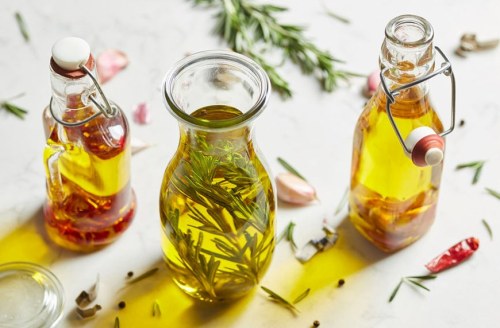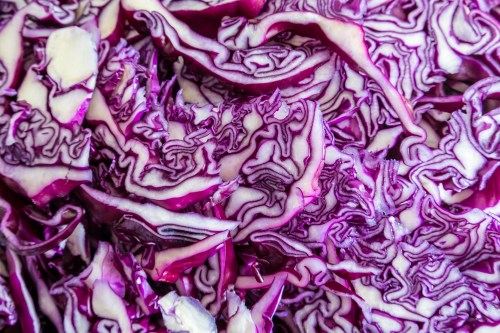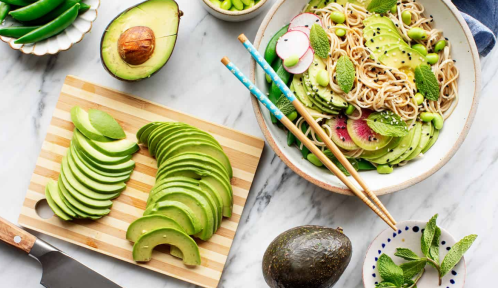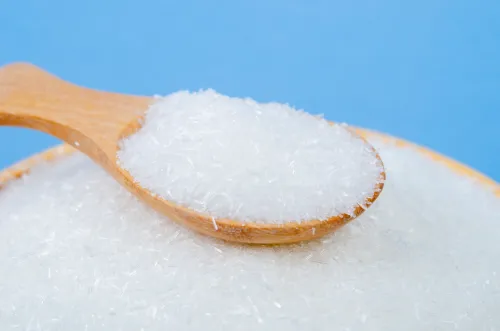Our editors independently select these products. Making a purchase through our links may earn Well+Good a commission
Once you sniff rosemary, you won’t forget it. The highly aromatic herb with needle-like leaves is native to the Mediterranean and is a popular go-to in cooking for giving food complex flavor. But, its ability to make your meals taste top-notch is just one of its many impressive qualities. Rosemary also offers plenty of beauty and health benefits too, and getting your daily dose via an easy-to-make DIY infused oil will allow you to have access to the plant’s superpowers whenever you need ’em most. Ahead we delve into how to make rosemary oil with just two ingredients in your slow cooker. Plus, the many ways to use every last drop of this essential oil loaded with benefits.
The benefits of rosemary oil—and how to use it
While there’s still much more research on rosemary oil to be done, several small studies have highlighted some of the promising perks of the fragrant herb. For instance, some research suggests that eating it could help keep your memory strong as you age. Meanwhile, other studies suggest that the simple act of smelling it could potentially help boost your mood (as it’s one of the best oils for anxiety) and amp up your cognitive performance. Sounds promising, right?
A few common rosemary oil uses
Aside from the host of health perks, rosemary oil could also be a great addition to your beauty routine. That’s because it’s been known as a powerful oil for hair growth. In fact, some beauty experts suggest that simply rubbing a drop into your eyebrows every night can promote the growth of new hair over time. Keep in mind, however, if you have extremely sensitive skin, pairing it with a carrier oil, which is a type of base or vegetable oil that can be used to dilute other oils, can help prevent irritation from any strong homemade herbal oils. (For example, a great option is avocado oil.)
Additionally, rosemary oil can potentially have some benefits for your scalp hair, too. Some folks even suggest adding a bit of rosemary oil to their shampoo to lengthen their locks and add volume and shine. Or you can also make a DIY rosemary hairspray to spritz onto your roots before a hair wash day.
What’s more, other potentially lesser-known rosemary oil uses include using it as a natural deodorant, gargling it to combat bad breath, and applying it to your skin, as the herb can act as a gentle disinfectant. It also has anti-aging and antiseptic properties, similar to mint, and it’s natural astringent benefits can potentially help with toning, tightening, and firming tissues to help your skin maintain its youthful contour. That’s to say, rosemary can possibly help with combatting some signs of aging by toning and tightening your complexion, and it might help with improving the skin’s elasticity, not to mention act as a disinfectant to counteract the damage from air pollution.
And, of course, it’s edible (and delicious) too. Although a little goes a long way due to its potent flavor, you can use it as a salad dressing, or drizzle it over your favorite roasted veggies for a chef-worthy dish.
How do you make rosemary oil at home?
When you’re ready to make your very own batch of rosemary oil, get excited because you only need two (yes, two!) ingredients. The shopping list: four fresh sprigs of rosemary and two cups of olive oil. That’s it. While you can brew the healthy elixir on the stovetop, the best—and easiest!—way to quickly infuse the herb into oil is in a slow cooker. Brilliant!
Even though the process takes a couple of hours, it’s so hands-off that you’ll be able to do other things around the house, like an impromptu meditation sesh or perhaps a cathartic closet clean-out, while it’s cookin’. Not to mention, it’ll infuse your home with the wonderful aromas of this pungent herb. On the other hand, if you’d rather make rosemary oil without cooking it, there’s another (slower) solution: Just put those same ingredients in a tightly-closed Mason jar and set the mixture in a sunny spot for a month, letting it infuse naturally. Yes, a little patience is involved. However, the results are just as potent and delicious.
DIY rosemary oil recipe
Ingredients
4 sprigs of fresh rosemary2 cups of olive oil
1. Remove the leaves from the rosemary sprigs
The first step in making your own rosemary oil is simple: wash and dry the herb thoroughly. Next, remove all the leaves from the stems. The best way to do this is to pinch the top end of the sprig to hold it in place, and then slide down the stem, stripping off the leaves as you go. This cooking hack will help spare you the tedious task of having to individually pluck each leaf off of the stem.
2. Combine the rosemary and olive oil in a slow cooker
Up next: Combine two cups of olive oil and all of your loose rosemary leaves in a slow cooker. Stir everything around to ensure the leaves are fully submerged in the oil. Then, let the mixture cook uncovered on the highest setting for two hours.
BTW, no slow cooker? No problem. As demonstrated in this recent TikTok video by @claudia.axe, you can also make rosemary oil at home using a double boiler method, where steam is used to slowly heat the mixture. To do so, you’ll simply combine the oil and rosemary leaves in a heat-proof, glass bowl. Meanwhile, you’ll fill a pot (that’s small enough that the glass bowl can snuggly sit on top) with water, about one to two inches high, and bring it to a simmer. Then, carefully place the glass bowl over the simmering water (ensuring the bottom isn’t touching the bottom of the bowl), and allow the steam to slowly heat the oil and rosemary infusion for about 15 minutes or so. This indirect cooking method will ensure the oil doesn’t scald, and the aromatics can slowly infuse without burning.
3. Cool and strain the mixture
After the rosemary oil is finished cooking, turn off the slow cooker and let the mixture cool for at least 30 minutes. Once it’s fully cooled down, pour the it through a strainer to remove the leaves from the liquid. Discard the leaves—their work here is done.
4. Transfer the liquid into air-tight containers for storage
Once your oil is rosemary-leaf-free, use a funnel to transfer the mixture to an airtight container. While some people prefer glass jars, others might prefer an easy-to-pour glass dispenser; although both options are great for storing your freshly-made ingredient in the kitchen. Et voilà! Beautiful, aromatic, and potent homemade rosemary oil.
How long does homemade rosemary oil last?
Although this may vary from every homemade batch to another, in theory, your final rosemary oil (keep in mind this doesn’t apply for rosemary water) concoction should stay nice and fresh for at least two months whether you’re using it in your cooking, in your shampoo, or on your face. But if you want to make bigger batches to use over a longer period of time, just stick it in the refrigerator where it’ll last up to six months.
An herbalist shares how to pick and choose the best herbs for your specific needs:
Sign Up for Our Daily Newsletter
Get all the latest in wellness, trends, food, fitness, beauty, and more delivered right to your inbox.
Got it, you've been added to our email list.











